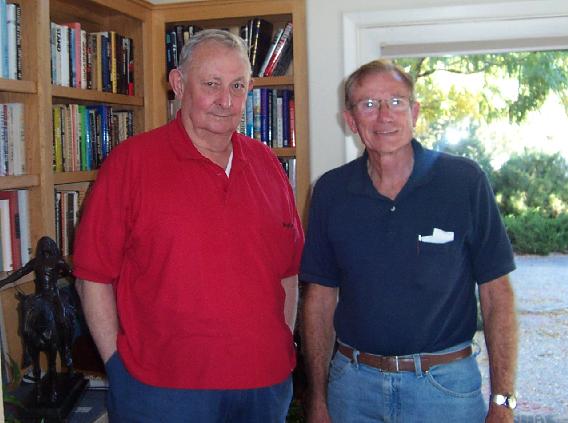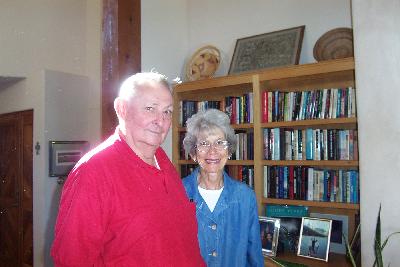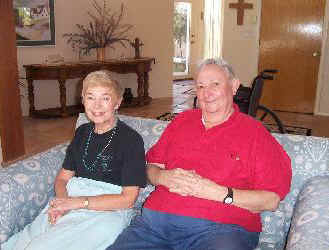An
Interview with Tony Hillerman
by Tom Scanlan

Author Tony Hillerman in his Albuquerque
home with Tom Scanlan
It was my pleasure to be able to interview one of America’s most popular
mystery writers this October. My wife Rosemarie and I met with Tony Hillerman and his wife
Marie at their lovely home in northwest Albuquerque, just east of the Rio Grande River. He
came outside to greet us in his drive, making us feel relaxed and welcome, following a
long drive from Zuni. Then he sat and chatted with us for two full hours, in spite of the
fact that he had just flown in from Washington state the day before, had been up late that
same night working on a new novel, and had a meeting later this evening to prepare for.
I had interviewed him by telephone back in 1995 (see Biblio-files in the November, 1995
Grapevine) so we were not total strangers. For this in-person interview, I had a
series of questions prepared--which of his own novels did he like best, who were his
favorite authors, what is his favorite music—but the formality of this approach soon
gave way to free flowing conversation on a variety of topics, many unrelated to writing,
but all providing insight into the admirable character of this popular writer.
Early on he admitted that his favorite among his own works, Finding Moon,
was not a favorite of his readers, nor of his editor. However, it was a novel that he had
always wanted to write, long before his Jim Chee and Joe Leaphorn novels. So finally he
broke from his mystery series and wrote the novel that had been in the back of his head
all these years—to take a "totally ordinary, un-heroic man and send him into a
situation where he develops character" (see review in Nov., 1995 Grapevine).
He’d taken the name Moon from a fellow infantryman in his rifle company whose courage
and character he had admired.

Tony
Hillerman and his wife Marie
Tony Hillerman with Rosemarie Scanlan
He also especially enjoyed writing Hillerman Country, a photographic
journey through the country which is the setting for most of his novels. It gave him his
only opportunity to work with his brother, Barney (who took the splendid photographs in
this oversize book) since they were teen-agers. It was fortunate timing because his
brother died shortly after the work was finished.
Hillerman prefers non-fiction to fiction, naming such writers as Joan Didion
(before she began writing novels) and H. L. Mencken. He sometimes puts himself to sleep
reading Bartlett’s Quotations. He especially enjoys the non-fiction writing in
The New Yorker, though he can no longer stand the fiction in that magazine. He
refrains from reading any fiction while he’s working on a novel, which is most of the
time, but did mention an affinity for Raymond Chandler’s novels. His wife, Marie, on
the other hand, reads a great deal of fiction as well as non-fiction and we were delighted
to hear that one of her favorite novels, Stegner’s Crossing to Safety, was
also one of our favorites.
When I asked what memoirs or biographies he had read which might have inspired
him to write his own memoirs, Seldom Disappointed, last year, he said his real
incentive came from the wishes of his children, his wife and his editor. Most of the
biographies he looked at were of celebrities and were ghostwritten so they weren’t
much help as a guide, although he did enjoy Truman, by McCullough. He finally
decided just to go ahead and write his memoirs ‘his own way’, and thoroughly
enjoyed the experience.
As for his favorite music, he likes ballads. CD’s he’s currently
listening to include James Taylor, Youngblood, Paul Simon and Judy Collins. He also likes
Joan Baez and much of Willy Nelson. He and his wife, Marie, share similar tastes in art
and music but he’s such a workaholic that she often has to remind him to ‘stop
and smell the roses’ (or more likely, ‘come and see this sunset’--because
they are both cloud lovers).
We also talked some about his days in the Army, and in spite of his battle
wounds, like most veterans he considers his hitch in the Army to be one of the highlights
of his life. He was unhappy with the inertia of the top brass and the fact that many of
the weapons the Army used were a bit behind the times and inferior to what the Germans
were using. G.I.’s were constantly grumbling about canvas machine gun ammo belts that
froze up in wet weather, and tracer ammunition that, unlike the delayed tracer of German
machine gunners, gave away the American gunner’s position.
The conversation got around to the terrorist attacks of September 11 and on
that topic he had some thought-provoking but positive ideas. He hoped that once Americans
got past the horror of that tragic event, they might begin to wonder seriously why some
people hate them so much. He also felt that this event was a wake-up call to our Pentagon,
reminding them that we are in a different world now, no longer fighting the Cold War.
In spite of the fact that he uses a computer to finalize his novels (his
experience with computers goes all the way back to the "trash-80"), he is still
intimidated somewhat by technology. He had lost the chapter he’d been working on the
night before by not saving it properly. In true Hillerman fashion, he made the best of
that common and frustrating situation by deciding that it needed rewriting, anyway. Tony
Hillerman is a very down-to-earth guy and I left his house that afternoon with the feeling
that I could go back anytime and pick up the conversation where we’d left off. The
two hours flew by and Rosemarie and I both felt that we were leaving close friends behind
when we walked out the door, still talking books with his wife, Marie.